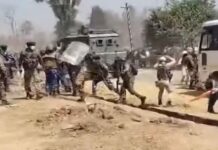Brahmins are known to have the purest and simplest weddings. The rituals in the marriage ceremony of a Brahmin hold the utmost importance throughout the wedding. The conjoining of two people in a Brahmin wedding has different rituals in different parts of India. Here is a list of how the ceremonies are held in all four corners of India.
North and West Indian Brahmin Weddings:
In the Northern and the Western part of India the rituals performed are very similar to each other. The rituals start from the matching of the kundlis of the bride and the groom but in recent times this ritual is fading away slowly because of the various matrimonial sites coming up. There are even matrimonial sites particularly for the people looking for brides or grooms within their caste. If you are looking for a brahmin bride or groom you can always look into brahmin matrimonial sites. Moving on, the kundli ritual is followed by roka and Mehendi ceremony.
The wedding day starts with the Haldi ceremony. It takes place on the morning of the wedding day. Applying haldi increases the glow of the skin. Further, the Baraat arrives in the evening. This commences the start of the main wedding. When the actual wedding procession starts the bride and the bridegroom jointly sit in front of the holy agni where Lord Agni is worshiped and presented with some offerings by the priest who officiates the wedding. This is followed by Kanyadaan, Saptapadi (seven rounds) and Varmala. The wedding concludes with Bidai.
South Indian Brahmin Weddings:
A South Indian Brahmin wedding is quite similar to that of the North Indian one but some of their rituals make them a bit unique. It begins with Nischaiyahtartham which is the engagement ceremony. Then on the day of the wedding, there is a fun event called Kashi Yatra. In this event, the groom pretends to quit the material world and head to Kashi while the bride’s father stops and convinces him to marry his daughter. In this event, both the bride and groom exchange garlands.
Towards the end, Kanyaadanam and Sapthapadi. This is similar to the North Indian wedding where the bride’s father places her hand in the hands of the bridegroom (Kanyaadanam) and then the bridegroom and the bride take seven rounds around the holy fire in the presence of a priest (Sapthapadi).
East Indian Brahmin Weddings:
The Brahmin weddings in East India kick off with Adhibas. In this ritual, both the families come together to sanctify the bride and groom. Then the match is solemnized by Brahmin pundits at one of the couple’s houses in the Aashirvaad Ceremony. Then under Vridhi, both families make offerings to their deities. Ganga Snan or Churakaran takes place, after Vridhi, on the day of the wedding at dawn. The couple, separately, prays to Goddess Ganga. Before the wedding, the bride is accessorized with red and white bangles which are considered very sacred in the tradition. This ritual is called Shanka Paula. Later, the wedding custom follows the bridegroom and the bride sitting together for the Saptapadi and chanting of mantras which conclude the wedding.






















































